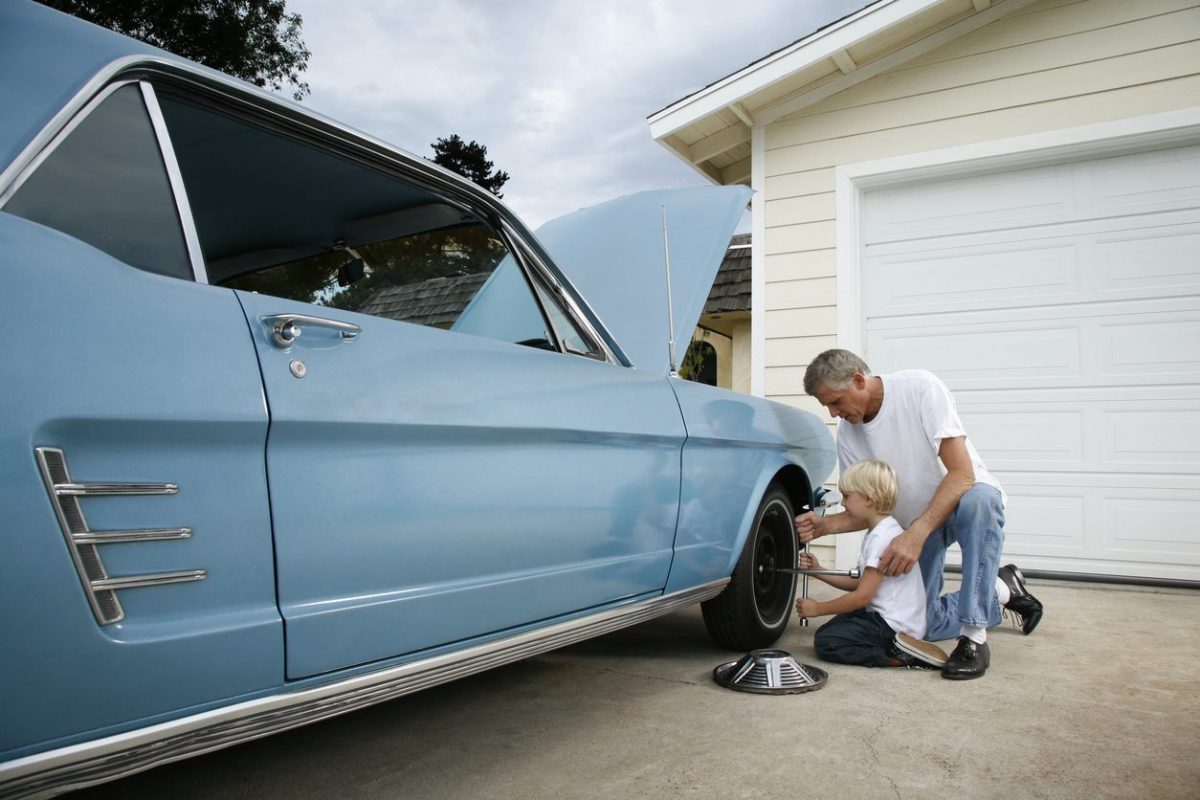Classic car storage and maintenance are both crucial topics when you have a highly valuable automobile.
Opening up your garage or other storage unit can be like peeking into a treasure trove. It’s nice to look inside and know that your cherished vehicle is protected and looking pristine thanks to the care you’ve put into it.
But what type of care does that involve? European and luxury car upkeep is a unique task, fitting to match the unmistakable look and performance these vehicles offer.
Here are some helpful tips on how to store your classic car in order to preserve its condition and limit wear. And when it comes to care under the hood and the technical side of vehicle upkeep, Hance’s European is here for you.
Classic Car Maintenance Tips (Before Storing)
Taking care of a classic car has a whole set of other challenges that you wouldn’t have with a more modern or standard car.
Because of the age and condition of various components, classic European cars require a lot more TLC to maintain their vintage appeal and avoid rusting. But all this maintenance is par for the course, and if you’re a classic car owner, you know the work is worth the results.
One of these important tasks is cleaning and detailing your car before you store it away. After all, just shielding it from the elements won’t undo any wear that’s already impacting it – it will just give it a chance to worsen.
Once the warmer weather approaches, you have to get your car prepped for a new season of driving. Here at Hance’s, we’d be proud to help with this task. Let’s divide the workload up into what you can do, then what we can do.
For You: Wash, Wax, and Detail Your Car
Part of the appeal of a luxury car is that unmistakable look. Classic car maintenance is a meticulous process, but the basics still stand. When you’re preparing your car for storage, start with a good wash.
This is the easiest thing you can do for your European vehicle. Be thorough, getting the undercarriage and in the wheel wells. This will get off the buildup of road salt, grime, and dirt that can lead to corrosion if left unchecked. Rust and rot can hurt your car’s exhaust and muffler systems, as well as coil springs and car frames.
Go from top to bottom so you don’t drag dirt upward. Save the fenders and bumpers for last because they will have the most dirt accumulation, which will contaminate the towel, sponge, or mitt you’re using.
Cleaning Supplies and Tips
The most effective cleaner is your standard mixture of soap and warm water. You may also want to pick up an alcohol-based cleaner containing at least 70% isopropyl alcohol for killing germs. This is safe for most car interiors.
Here are some of the supplies you will need to gather before beginning your cleaning project. They include:
- Bucket for soap and water
- Brush for scrubbing stains
- Comfortable clothes that you don’t mind getting dirty
- Leather conditioner for cleaning leather seats
- Vacuum
- Glass-cleaning spray
- Microfiber cloth
- Mask
- Gloves
Remember to be patient and thorough when cleaning your vehicle. Classic car maintenance is akin to polishing a jewel, so take your time and ensure that everything is done safely.
The result will be an auto that sparkles and shines whether it’s in storage or out on the roads for all to see.
Wax Your Car
Wax your car when done cleaning to protect the paint job. Reapply every five weeks. According to Car and Driver, a proper coat of wax can function as a protective seal against dirt and debris.
Remember that even though proper classic car storage can seal your vehicle away from the world, dust and bacteria can still find their way inside the housing structure – but they won’t be able to break through a thorough coat of high-grade wax.
Don’t Forget the Interior
Interior cleaning is crucial for looks and safety. Think about the surfaces you touch regularly, such as the steering wheel, radio controls, door handles, seat belt buckles, armrests, cup holders, and window operation buttons.
Germs and bacteria love warm, moist places, and your car’s heating and AC system provides the perfect breeding ground for them. The heater is located close to the engine, and your AC often emits humid air. All that air is chock full of dust and carbon particles, which are the preferred diet of nasty germs
In order to disinfect your vehicle properly, follow these steps:
- Put on a mask and gloves.
- Remove all dirty floor mats.
- Vacuum the interior to remove debris.
- Dip a cloth into the bucket and gently clean the seats.
- Scrub the removed mats using a soapy solution.
- Dip a cloth into the alcohol solution and wipe down all the most touched surfaces of your car, such as door handles, radio knobs, vents, steering wheel, gearshift, glove box, and rearview mirror.
- Let the alcohol solution sit for about 15 minutes to ensure bacteria and viruses are killed.
- Wash the windows and mirrors with soap and water and a cloth or squeegee. Alternatively, you can use window cleaning spray and paper towels.
- Let everything dry.
- Dispose of the mask and gloves.
- Add a car freshener of your favorite scent if desired.
Leather needs special care and attention, as it can get ruined if you use the wrong products or leave it wet for too long. Dip a cloth into the soap and water and gently scrub the leather. Do not use the alcohol solution. To restore the shine and durability of your leather seats, use a leather conditioner after cleaning.
With all these steps taken, your antique or vintage car will feel anything but old. Sitting in it will feel like walking into a perfectly preserved piece of the past, that’s as pristine and polished as it is prized, and ready to perform on the road at any time.
For Us: Servicing and Repairing Your Auto
Before you can put your classic car in storage, you’ll want to make sure everything is working properly on it. After all, the mood may strike and you may decide to take it out for a spin one day when the weather is nice.
Proper auto upkeep is what we’re all about here at Hance’s. We are dedicated and well-trained specialists in European and luxury cars, so you’ll know your vehicle is in good hands with us.
Even if it seems to be running fine now, make sure you have it checked just in case. Some problems can grow worse if left alone, so get your vehicle a thorough check before putting it in storage.
Our specialists in European and luxury car upkeep can provide everything you need.
Our Classic Car Maintenance Services
Need new wiper blades? New blades are better at clearing water, which will improve visibility. Generally, you should have us switch out your blades every six months.
How about tires? It’s a fact that worn tires limit braking power. We can top tires off, and replace tires that are showing signs of wear. This can also improve your car’s handling and fuel economy.
When you turn the AC to its highest setting, does it reach the proper temperature quickly enough? If not, schedule maintenance. We can troubleshoot the system and replace parts like filters if necessary.
Additional classic car maintenance services we offer include (but are not limited to):
- Oil change
- Brake inspection and service
- Engine tune-up
- Battery inspection and maintenance
- Air filter replacement
- Fluid flushes and refills
- Wheel alignment
With us providing these services, your classic car will be ready for anything – whether it’s a road trip, a car show, or a season in storage.
How to Store a Classic Car
Now that your prized auto is cleaned, waxed, and serviced, we’ve reached the time for classic car storage. Don’t think of it as hiding your baby away – think of it as letting it rest until the time is right for the next ride.
Once the nice weather is winding down and you’re ready to store your classic car for a few months, you’ll have to do it properly or else risk damage in the form of rust and pest infestation. Damage of any kind can affect how your classic car looks and performs, and can detract from its lifespan.
Classic car storage is one of the most important aspects of caring for your cherished vehicle, so here are some tips about the ideal area and proper prep work.
Choose the Right Location
The storage location matters. Make sure the area you choose offers enough protection from the weather, temperatures, and moisture while offering the highest levels of security.
Let’s go over some common places where people keep their classic cars in the off-season, as well as provide tips on how best to store your car.
- Brick Garage: Whether attached to your home or as a standalone unit, brick buildings are the best choice. They can maintain stable temperatures within moisture-free environments to guard against condensation.
- Concrete or Wooden Units: These also offer good protection, but wood structures such as sheds or barns aren’t the most secure or stable against the weather long-term.
- Outdoors: If you have no other choice but to store your car outside, there are ways to protect it. Buy a car cover designed for your exact type of classic car. This will protect it from pollen, bird droppings, tree sap, and moisture. To protect the tires, lift the car off the ground, putting it on bricks or blocks.
To prevent the accumulation of odors over the next several weeks, roll the windows down slightly to allow fresh air to circulate. Opening them too much could allow critters in. To deter them, make sure there are no crumbs or food items near your storage location.
If you have a convertible with a top, leave the top up in storage to maintain its shape. If you leave it down, it could shrink. Also if you are storing your car outdoors, try to use a cover or awning to prevent the paint from fading from excessive sunlight.
Prep, Check, and Service Your Stored Auto
Preserve the charge by disconnecting the battery. Even just sitting there, your battery could lose juice. Or, if you prefer, you can start up the engine every few weeks and run it for 5-10 minutes.
Check all fluids regularly, including the oil, coolant/antifreeze, transmission fluid, and brake fluid. Or if you want, bring it down to Hance’s and we’ll handle this part for you.
If you see minor rust spots, apply a quality solution recommended by the vehicle’s manufacturer regularly to the area to prevent the growth of rust or at least slow its progression.
Maintaining, cleaning, and storing your classic car is a labor of love for many owners. We are here to help, offering service on all kinds of European classic vehicles.
Contact Hance’s European for Classic Car Maintenance and Servicing
When you take the above approach to classic car storage, you can feel comfortable knowing your prized auto is safe. You’ll have the same sense of relief when you trust Hance’s for all your European and luxury car upkeep.
Our certified and highly-skilled technicians have received great reviews for our work on a variety of high-end vehicles, including makes like:
- Audi
- BMW
- Bentley
- Jaguar
- Land Rover
- Mercedes
- Porsche
- Volkswagen
These and other autos are in skilled and caring hands when they’re with us. We know you value your prized luxury or European vehicle, and we cherish the chance to work on them for you.
To ensure your classic is road-ready or safe for storage, schedule your appointment by calling us at (214) 800-4571 or making an appointment online. Remember, regular maintenance is vital for your classic European automobile!


 BMW
BMW Mercedes
Mercedes Jaguar
Jaguar Land Rover
Land Rover Volkswagen
Volkswagen Porsche
Porsche Audi
Audi